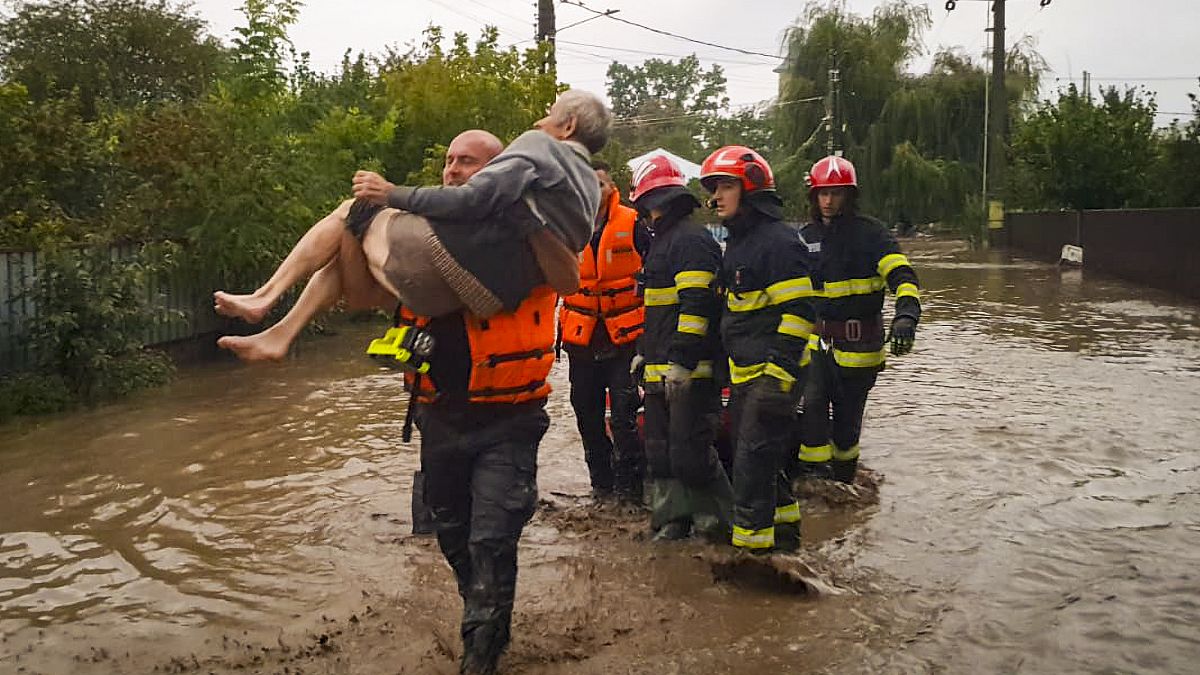As severe floods make their way through Central Europe, countries are being hit by what could become the worst floods in almost 30 years.
At least five people in eastern Romania have been found dead after torrential rainstorms dumped unprecedented rain, leaving hundreds stranded in flooded areas, emergency authorities said Saturday.
Rescue services scrambled to save people in the hard-hit eastern counties of Galati and Vaslui. The bodies of three elderly women and two men were found in the localities of Pechea, Draguseni, Costache Negri, and Corod, the Department for Emergency Situations said.
Authorities later added that one of the victims had been dead for two days and “did not die due to the effects of the weather” but from other causes.
Emergency authorities released video footage showing teams of rescuers evacuating people using small lifeboats through muddy waters and carrying some elderly people to safety.
Some of the most significant flood damage was concentrated in Galati where 5,000 households were affected. A Black Hawk helicopter was also deployed there to help with the search and rescue missions.
The storms battered 19 localities in eight counties in Romania, with strong winds downing dozens of trees that damaged cars and blocked roads and traffic. Authorities sent text message alerts to residents to warn them of adverse weather as emergency services rushed to remove floodwaters from homes.
By 1 pm local time (midnight CET) on Saturday, more than 250 people had been evacuated with the help of 700 interior ministry personnel deployed to affected communities, authorities said.
Romania’s Environment Minister Mircea Fechet said that in some of the badly flooded areas, more than 160 litres of rain fell per 1 square metre, which he said is a rare occurrence.
“What we are trying to do right now is save as many lives as possible,” the minister, who was on his way to Galati to assess the situation, said.
Romanian President Klaus Iohannis offered his condolences to the victims' bereaved families, writing on Facebook: "We must continue to strengthen our capacity to anticipate extreme weather phenomena.”
“Severe floods that have affected a large part of the country have led to loss of lives and significant damage,” Iohannis said. “We are again dealing with the effects of climate change, which are increasingly present throughout the European continent, with dramatic consequences on people.”
The stormy weather comes as several central European nations anticipate severe flooding to hit the Czech Republic, Poland, Austria, Germany, Slovakia, and Hungary over the weekend.
Tens of thousands lose power in the Czech Republic
In the Czech Republic, river waters reached dangerous levels in dozens of areas across the country on Saturday morning, flooding houses and roads in several towns and villages. Heavy rain and high winds left more than 63,000 households without power, the Czech power company CEZ said.
The Central Flood Commission of the Czech Republic announced that the most critical situation was in the Moravian-Silesian Region and called on the Governor of the Moravian-Silesian Region to declare a state of danger under the Crisis Act said Minister of the Environment Petr Hladík after today's meeting of the Commission.
A hospital in the Czech Republic's second-largest city, Brno, was forced to evacuate as dozens of citizens moved to safer grounds. Fallen trees and floodwaters also caused a dozen railways across the country to shutter.
The Czech Hydrometeorological Institute reported 35 locations where flooding had been reported. The fastest rising water levels are in the Jizera Mountains and Jeseníky Mountains.
The torrents of water are complicating transport, tens of thousands of households remain without electricity. Due to the extreme weather, trains were not running on dozens of lines across the country this morning. Some because of fallen trees, others for precautionary reasons.
Meteorologists say a low-pressure system from northern Italy was predicted to dump much rainfall in most parts of the Czech Republic, including the capital and border regions with Austria and Germany in the south and Poland in the north.
Czech authorities erected metal barriers or protective walls from sandbags, while water was released from dams to make space in reservoirs.
“We have to be ready for worst-case scenarios,” Czech Prime Minister Petr Fiala said after the government’s central crisis committee met. “A tough weekend is ahead of us.”
"We are currently making preparations for a possible rise in the water level of the local river, so this is a precautionary measure. As in most places," said Aleš Chovanec, Deputy Commander of the Holasice Volunteer Fire Brigade.
Central Europeans are especially wary because some experts have compared the weekend forecast to devastating floods in 1997 in the region, referred to by some as' the flood of the century.'
Over 100 people were killed in the floods 27 years ago, including 50 in eastern Czech Republic, where large sections of land were inundated.
Dozens evacuated in Poland
In Poland, dozens of people were evacuated as a precautionary measure on Saturday from two villages near the town of Nysa, in the Nysa River basin, after meteorologists warned of unprecedented rainfall, and water levels on some rivers in the area sharply rose, according to Interior Minister Tomasz Siemoniak. “The worst is yet to come,” he warned.
Polish authorities appealed to residents on Friday to stock up on food and to prepare for power outages by charging power banks.
The Biała Głucholaska River in Poland, which exceeded the alarm level by more than two meters during the night, also risks flooding. Some city residents whose houses are located near the river were evacuated during the night.
Elsewhere in Europe
Around 80 litres of water per square metre have already fallen in the Kamptal in Austria, with up to 200 more litres forecasted. The water levels in the Kamp are already threatening. Municipalities in the districts of Zwettl, Horn, Krems and Tulln have been declared disaster areas.
The situation on the Danube river is also worsening significantly due to the expected heavier rainfall in the Danube basin, keeping emergency services busy in Slovakia and Hungary as well.
On Saturday morning, a crisis team met in Bratislava, and flood barriers will now be built in Slovakia's capital.
Heavy rain also hit Moldova on Saturday, where emergency workers pumped floodwater from dozens of peoples’ homes in several localities, authorities said.
Meteorologists say a low-pressure system from northern Italy was predicted to dump much rainfall in most parts of the Czech Republic, including the capital and border regions with Austria and Germany in the south and Poland in the north.
The weather change arrived following a hot start to September in the region, including in Romania. Scientists have documented Earth’s hottest summer, breaking a record set just one year ago.
A hotter atmosphere, driven by human-caused climate change, can lead to more intense rainfall.












